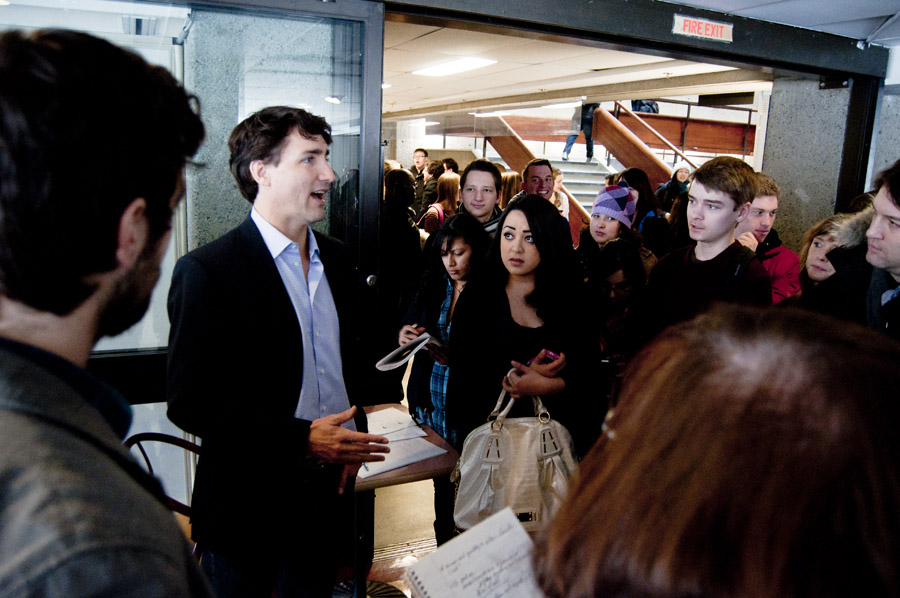Justin Trudeau—a hopeful for the leadership of the Liberal Party of Canada—spoke to McGill students and staff on Feb. 19 about the supposed political apathy of younger generations, the importance of engaging in politics, and the difference he believes a Trudeau government would bring.
Since October, Trudeau has been making his way across the country, meeting supporters, taking questions, and listening to concerns of Canadians.
“This is the most engaged generation,” Trudeau said to an the over-crowded audience in the SSMU Building’s Lev Bukhman room. “This is a generation that is deeply aware it is our responsibility to shape the world around us with our actions. The fact that we are not connecting with politics is a reflection of the politicians, not the citizens.”
“Politics has become increasingly about scoring points, about voting against something,” he continued. “The idea of voting for something is something that seems very much removed from politics these days…. We need politics to be much more engaging, much more accessible.”
Trudeau also discussed his approach to creating a nationalist, unitary, Canadian vision.
“Canada is not a cynical country,” he said. “[We are Canadian] not despite our differences and perspectives, but because of our differences and perspectives.”
Trudeau spoke at Dawson College just before coming to McGill, where he addressed the question of language tensions in Quebec.
“People no longer see a tremendous conflict between the English and the French,” he said at Dawson.
However, Trudeau also highlighted at Dawson that he didn’t see any sense in strengthening Quebec language laws, according to Liberal McGill President Eric Hendry, who was in attendance.
During his presentation at McGill, Trudeau said that, if elected, his leadership would focus on strengthening the middle class and improving life for Canadians.
“The middle class is sliding downwards, and it’s not providing a ladder of opportunity,” he said. “We need to grow the economy, and share it.”
During the question and answer period, a McGill student asked Trudeau about his stance on education and if he would consider pursuing educational reform. Trudeau said that if he were to lead the federal government, it would play a more hands-on role in higher education.
“The fear of debt is preventing us and slowing us down in attaining post-secondary education,” he said. “We need to figure out how to be a knowledge-based economy and understand how to access our resources, which is all of you.”
Trudeau also briefly addressed the issue of his age, and said that he does not feel like it will serve as a limitation to political success.
“Age is less important than compassion and strength,” he said.
Adam Templer, U0 arts, said that he has high hopes for Trudeau’s future.
“[Trudeau] is definitely looking to change the future in Canadian politics,” Templar said. “Judging by how his father did, I think people already know his name. He’s a good bet to succeed. I think he is going to be a major player in Canadian politics.”
Hendry also expressed optimism about Trudeau’s presentation and the future of the Liberal Party, but expressed some reservations about Trudeau’s campaign.
“I think that the energy and enthusiasm that we saw at the event on Tuesday is a really encouraging sign,” he said. “I’m sensing a new optimism about the Liberal Party from university students, and I think a lot of that has to do with Justin’s campaign.”
“While I have concerns about the lack of a clear policy focus in his campaign so far, I think he’s managed to really connect with people and inspire them to get involved in politics, and to play a role in shaping Canada’s future,” Hendry continued.








